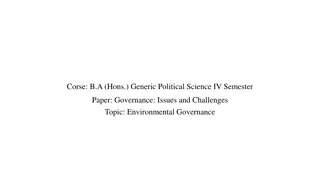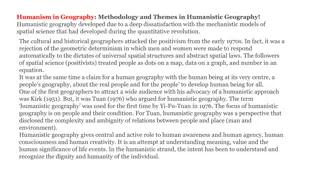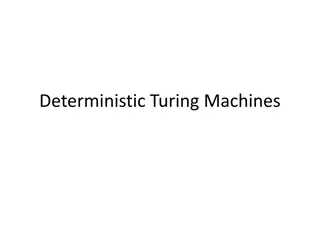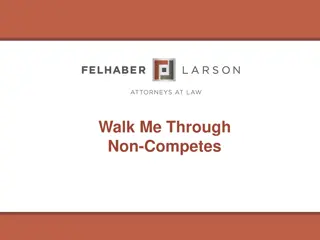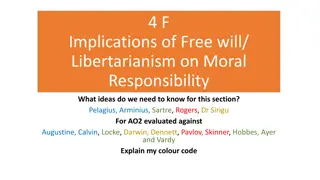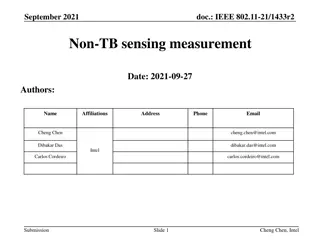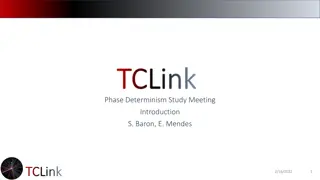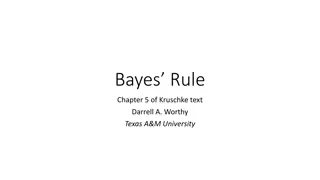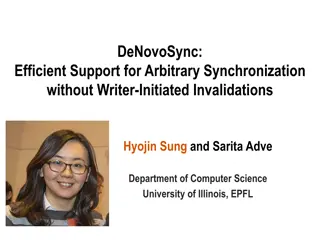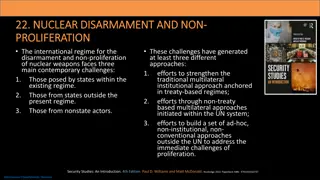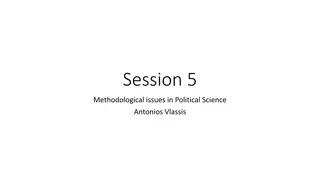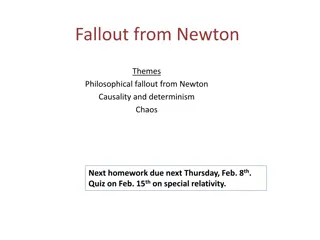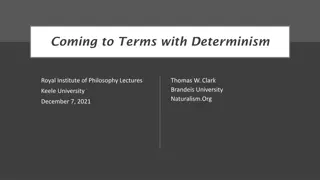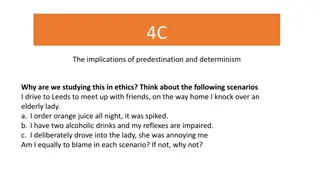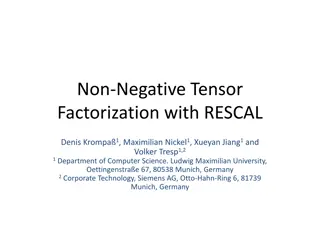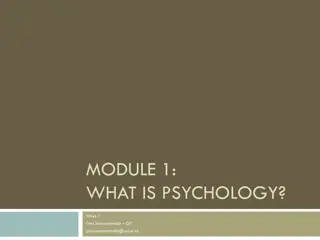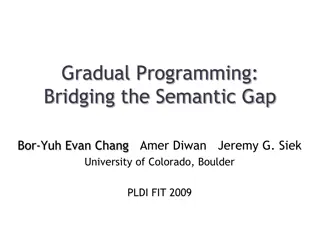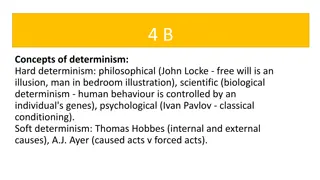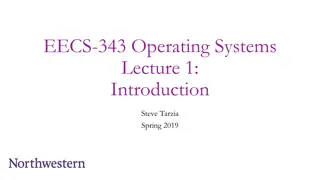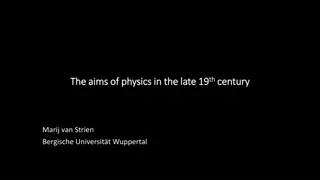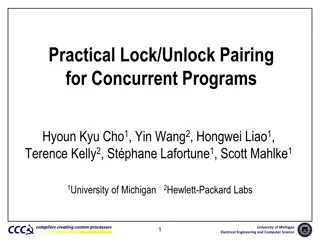Challenges and Opportunities for Reforms of Non-Oil Revenues Administration in South Sudan
The presentation highlights the reliance on oil revenues in South Sudan and the need for reforms in non-oil revenue administration. It discusses sources of non-oil revenue, factors hindering revenue mobilization, and opportunities for reforms to diversify the economy. The objectives of non-oil reven
3 views • 23 slides
Understanding Petri Nets: A Versatile Tool for Modeling Systems
Petri nets are a powerful modeling tool characterized by their asynchronous state transitions, making them ideal for representing concurrent and distributed systems. Originating from Carl Adam Petri's work in the 1960s, Petri nets have found diverse applications in fields such as computer science an
1 views • 84 slides
Exploring Citizen Journalism and Non-Fiction Writing
Explore the world of citizen journalism and non-fiction writing, learning about text types, adapting writing to conventions, considering audience, purpose, and tone. Discover the significance and usefulness of non-fiction writing, and delve into creating various text types. Uncover the role of citiz
1 views • 11 slides
HUMAN GEOGRAPHY
Human geography examines how human groups adapt to their natural environment. It covers various branches such as social, economic, population, historical, political, and military geography. The discipline also explores fundamental principles and theories like environmental determinism, possibilism,
0 views • 6 slides
Establishing Safety Standards in Non-Movement Areas at Smith Reynolds Airport
This guide outlines the purpose, definitions, rules, and safety measures for operating vehicles in non-movement areas at Smith Reynolds Airport. It emphasizes standardized ground movement practices to ensure the safety of airport patrons, reduce the risk of injury, and maintain a high level of safet
1 views • 12 slides
Understanding Personality Development: Social-Cognitive and Behavioral Perspectives
Social-cognitive theorists view personality development as influenced by the interaction between individual traits and social context, while behavioral theorists focus on learning effects. They relate by emphasizing behavior learning through conditioning and observation, alongside mental processes.
0 views • 19 slides
Understanding Human-Environment Interaction: Environmental Determinism vs. Possibilism
Human-environment interaction is a two-way process shaping cultures and behaviors. Explore the theories of environmental determinism and possibilism, which offer contrasting views on the influence of physical conditions on human societies. Environmental determinism emphasizes the impact of the envir
0 views • 18 slides
Understanding Non-Aqueous Solvents: Types and Classification
Inorganic non-aqueous solvents play a crucial role in chemical research and industry. This article by Dr. Princy K.G. delves into the classification of solvents based on protonicity, polarity, and aqueous vs. non-aqueous nature. It explores the types of non-aqueous solvents, such as protonic and non
1 views • 29 slides
Humanism in Geography: Methodology and Themes
Humanistic geography emerged as a critique of mechanistic spatial models during the quantitative revolution, emphasizing human agency, consciousness, and creativity in understanding the complexities of human-place relationships. It rejects geometric determinism and celebrates individual dignity, pro
0 views • 4 slides
Understanding Deterministic Turing Machines
Detailed explanation of Deterministic Turing Machines, their constituents, formal definition, determinism, and special statuses such as Start, Accept, Reject, and Loop. Includes visual representations and key concepts of deterministic Turing machines.
0 views • 14 slides
NVMe Endurance Group Management: Enhancing SSD Performance
SSD customers have diverse media organization needs, such as capacity pools, performance isolation, or combined pools for varied use cases. NVMeTM Endurance Group Management enables configuring media into Endurance Groups and NVM Sets, catering to different storage requirements efficiently. Learn ab
0 views • 20 slides
Understanding Non-Firm Quantities in Electricity Markets
Non-Firm Quantities in electricity markets involve units with non-firm access not being compensated for their non-firm capacity not getting accommodated on the system. The concept of Firm Access Quantity plays a key role in determining compensation levels for units, with differences in implementatio
0 views • 6 slides
Understanding Non-Compete Agreements: Enforceability and Requirements
Non-compete agreements are commonly used in the United States to protect businesses from competition by former employees. To be enforceable, these agreements must meet certain requirements, including independent consideration, protection of legitimate business interests, and reasonableness in scope,
0 views • 26 slides
Moral Responsibility and Free Will Implications in a Contemporary Context
This text delves into the implications of free will and libertarianism on moral responsibility, examining the ideas of various philosophers and thinkers such as Pelagius, Arminius, Sartre, and more. It explores the concepts of moral agency, determinism, normative ethics, religious beliefs, and the c
5 views • 12 slides
Comparison of Trigger-based vs. Non-Trigger-based Sensing Measurement in IEEE 802.11
The document discusses the differences between Trigger-based (TB) and Non-Trigger-based (Non-TB) sensing measurement instances in IEEE 802.11 standards, focusing on who initiates the sensing measurement. TB sensing is initiated by the AP, while Non-TB sensing is initiated by a non-AP STA, enabling o
6 views • 13 slides
Understanding Phase Determinism Study Meeting Presentation
This presentation covers various aspects of phase stability, reproducibility, and determinism in TCLink architecture. It includes open questions regarding temperature variations, performance relationships, clock synchronization, stability enhancements, and architectural considerations. Detailed outl
0 views • 9 slides
Understanding Bayes Rule and Its Historical Significance
Bayes Rule, a fundamental theorem in statistics, helps in updating probabilities based on new information. This rule involves reallocating credibility between possible states given prior knowledge and new data. The theorem was posthumously published by Thomas Bayes and has had a profound impact on s
0 views • 34 slides
Efficient Support for Synchronization Without Invalidations
Addressing complex software issues like data races and inefficiencies in hardware synchronization, the DeNovoSync solution provides efficient support for arbitrary synchronization without writer-initiated invalidations. By introducing disciplined shared memory with structured synchronization and exp
0 views • 40 slides
Exploring European Theatre Traditions
European theatre traditions, as discussed through Lehmann's Postdramatic Theatre and Aristotle's dramatic elements, highlight the unique characteristics that differentiate them from non-European traditions. Concepts such as hamartia, anagnorisis, and mimesis are explored along with the rejection of
0 views • 30 slides
Contemporary Challenges in Nuclear Disarmament and Non-Proliferation Regime
The international regime for nuclear disarmament and non-proliferation faces challenges from states within and outside the regime, as well as non-state actors. Various approaches are being utilized to address these challenges, including strengthening multilateral institutions, non-treaty-based multi
0 views • 12 slides
Enhancing Replay Interface Efficiency in System Debugging
Efforts by researchers at Microsoft Research Asia and MIT focus on enhancing replay interface efficiency for system debugging. The motivation stems from the non-determinism challenges caused by time, user input, network I/O, and thread interleaving. The study observes that only certain parts of a pr
0 views • 26 slides
Understanding P vs. NP: A Comprehensive Overview
Delve into the complexities of computational problem-solving with insights on P, NP, NP-complete, determinism, and non-determinism. Explore the distinctions between deterministic and non-deterministic algorithms and the implications they have on problem-solving capabilities. Gain a deeper understand
0 views • 22 slides
Improving Attainment and Progress of Disadvantaged Pupils in Sheffield
Attainment and progress of disadvantaged pupils in Sheffield show an improving trend across key stages, although the gaps between disadvantaged and non-disadvantaged students are not closing fast enough. Data suggests that disadvantaged pupils with low prior attainment are making better progress in
0 views • 29 slides
Understanding Non-Profit Accounting Essentials
Learn the basics of non-profit accounting, including what defines a non-profit organization, common types of non-profits, governance structures, and legal responsibilities. Discover key insights on IRS and state requirements for non-profits in this informative presentation by Jessica Sayles, CPA fro
0 views • 55 slides
Further Discussion on Non-primary Channel Access in IEEE 802.11
This contribution delves into the utilization of non-primary channels for access in IEEE 802.11 networks, focusing on enhancing frequency reuse, adhering to ETSI standards, evaluating CCA capability types, and analyzing non-ideal deployment scenarios. It discusses the complexity and benefits of non-
0 views • 26 slides
Understanding Classical Marxism: Key Concepts and Critiques
Marxism, rooted in the ideas of Karl Marx, emphasizes the significance of economic relations in shaping social and political structures. Classical Marxism focuses on economism, determinism, materialism, and structuralism, viewing history through a lens of class struggle and offering an emancipatory
0 views • 21 slides
Efficient Hardware Support for Disciplined Non-Determinism in Shared Memory Systems
DeNovoND presents a holistic approach to rethinking memory hierarchy, aiming to enhance hardware efficiency for disciplined non-determinism in shared memory systems. The work addresses limitations in deterministic programming, offering strong safety properties and simplified coherence and consistenc
0 views • 28 slides
Newtonian Determinism and Philosophy: A Critical Examination
Within Newton's philosophical framework, the interplay between causality, determinism, and empiricism shapes his views on space, time, and the nature of reality. Examining his rules of reasoning and the implications of Newtonian determinism, we delve into the philosophical underpinnings of his scien
0 views • 16 slides
Exploring Determinism: Insights on Free Will and Causality
Delve into the philosophical discourse on determinism with a critical examination of free will, agency, and the implications of causality. Discover how leading thinkers challenge the conventional notions of choice and explore the complexities of human behavior in light of scientific revelations.
0 views • 26 slides
Exploring Determinism and Predestination in Ethics
Delve into the implications of predestination and determinism in ethical discussions, pondering scenarios like moral responsibility in various situations. Match thinkers with their theories on determinism, and discover key vocabulary related to the impact of determinism on moral responsibility and p
0 views • 10 slides
Exploring Concepts of Free Will and Predestination in Philosophy and Religion
Delve into the intricate debate surrounding free will and predestination from philosophical, scientific, and religious perspectives, examining arguments from determinism to libertarianism. Evaluate the compatibility of predestination and free will, religious views on free choice, and the implication
0 views • 15 slides
Non-Negative Tensor Factorization with RESCAL
This article discusses non-negative tensor factorization with RESCAL, covering topics such as Non-Negative Matrix Factorization, Multiplicative Updates, RESCAL for Relational Learning, and Non-Negative Constraint for RESCAL. It explores how factorizing matrices/tensors into non-negative factors can
0 views • 11 slides
Understanding Psychology: From Early Philosophy to Modern Practices
Psychology, originating in the study of the soul and mind, has evolved into a science focusing on behavior and experience. Key philosophical issues such as free will vs. determinism and nature vs. nurture continue to shape the field. Psychologists serve individuals and organizations in diverse roles
0 views • 19 slides
Bridging the Semantic Gap in Gradual Programming
Observing a disconnect between programmer intent and program meaning, Gradual Programming by Bor-Yuh Evan Chang, Amer Diwan, and Jeremy G. Siek explores tools' lack of knowledge in understanding programmers' priorities, hindering productivity and reliability. Through examples like iteration orders a
0 views • 8 slides
Understanding Determinism: Hard and Soft Concepts Explored
Determinism posits that all events are determined by preceding causes, impacting human behavior as well. Hard determinism denies free will, attributing actions solely to external factors, while soft determinism allows for free will alongside external influences. Philosophical, scientific, and psycho
0 views • 9 slides
Introduction to Operating Systems: EECS 343 Lecture Overview
In this introductory lecture of EECS 343 Operating Systems, Professor Steve Tarzia discusses the course structure, importance of studying OS, key topics like security and performance, course logistics, prerequisites, and collaboration policy. Students will gain valuable experience with C, Linux, and
0 views • 27 slides
Exploring the Interplay of Freedom and Determinism: Hobbes's Regress Argument
Delve into the philosophical debate between freedom and determinism through the lens of Hobbes's Regress Argument, examining the challenges posed by the relationship between freedom of action and freedom of will in the context of human decision-making.
0 views • 21 slides
Early Positivism and the Positive School of Criminology
The early positivist school of criminology, including figures like Lombroso and Gall, focused on applying scientific methods to understand criminal behavior. Phrenology, atavism, and criminal anthropology were key concepts explored, emphasizing determinism and individual offender characteristics. Th
0 views • 18 slides
Evolution of Physics Goals in the Late 19th Century
Physicists in the late 19th century shifted towards modesty regarding the aims of physics, moving away from ontology and truth claims. The ideal of reduction to matter and motion was criticized, and determinism was seen as a regulative principle rather than a proven feature. The concept of descripti
0 views • 35 slides
Practical Lock/Unlock Pairing for Concurrent Programs
The research discusses the challenges of concurrency in parallel programming and the importance of proper lock/unlock pairing to avoid bugs and non-determinism. Tools for bug detection and automated bug fixing are explored, along with examples illustrating the process. The issue of unpaired locks an
0 views • 20 slides






